A Portrait of an American City
Pittsfield, Massachusetts
Time travel is still impossible. The next best thing is history. History in many ways is time travel and postcards may be the best time machines we have.
Postcard History invites you to read about this city with a great history and some fascinating residents. We will look at the attributes that make a city: the famous residents, the post office, the city hall, banks, schools, museums, and churches. And, one last thing will be included, a piece of the city’s “lost history.”
The homes of three Pittsfield residents.
Herman Melville’s Arrowhead
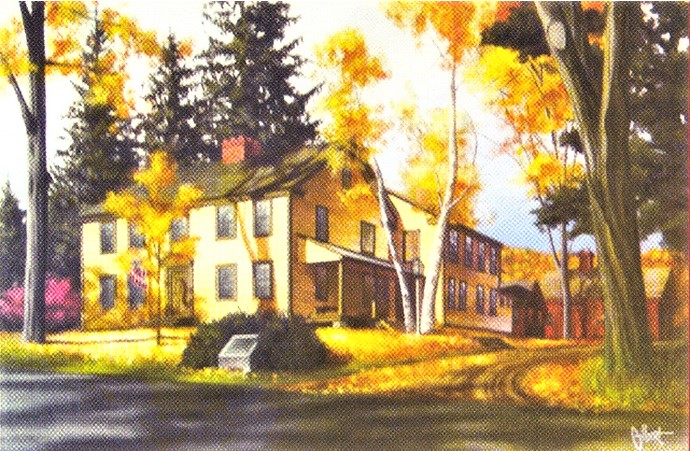
Arrowhead
The house at 780 Holmes Road, Pittsfield, Massachusetts sits but a few yards from the highway, the grass is mown short, but all else within the landscape is the undeniable work of Mother Nature.
After his three year adventure aboard the Acushnet, a whaling ship out of New Bedford, Massachusetts, Herman Melville moved his family from New York to Pittsfield, looking for a quiet place to write. It was at this home where he completed his most famous novel, Moby Dick.
The house is a rather spacious 18th century farm-house, outfitted in period furnishings and many of Melville’s own possessions. Melville could see Mount Greylock from his bedroom window and often took comfort in the likeness of the mountain to his memory of a whale’s profile against the sky above the Pacific.
Today the property is owned by the Berkshire County Historical Society. If you visit you will see the fireplace that is the central character in Melville’s short story, I and My Chimney, first published in Putnam’s Monthly Magazine in 1856.
Oliver Wendell Holmes’s Holmesdale
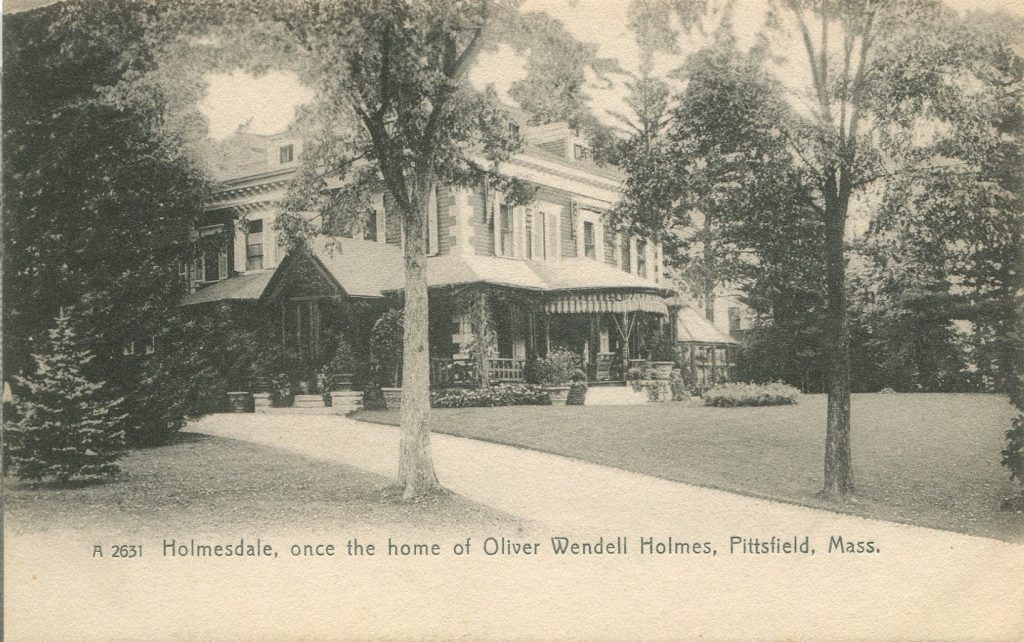
Holmesdale, circa 1902
Holmesdale is also on Holmes Road, in Pittsfield but unlike Arrowhead it is on a 22,000-acre estate. Of clapboard construction, the “cottage” was built by Holmes as a summer residence where he and his wife Amelia could escape the heat.
Confusion comes easy over the name Oliver Wendell Holmes. The reason is simple, for it is still common practice to be the namesake of a parent, and such was the case with these Olivers, Senior and Junior. Both were successful men. Senior was born in Massachusetts in 1809, he was a physician, but his fame came from his writing.
Junior was born in 1841 in Massachusetts like his father. He became one of America’s best known Supreme Court judges. His highly regarded opinions concerning economic law and civil rights were often the decision of the majority.
Henry Wadsworth Longfellow’s home on Elm Knoll
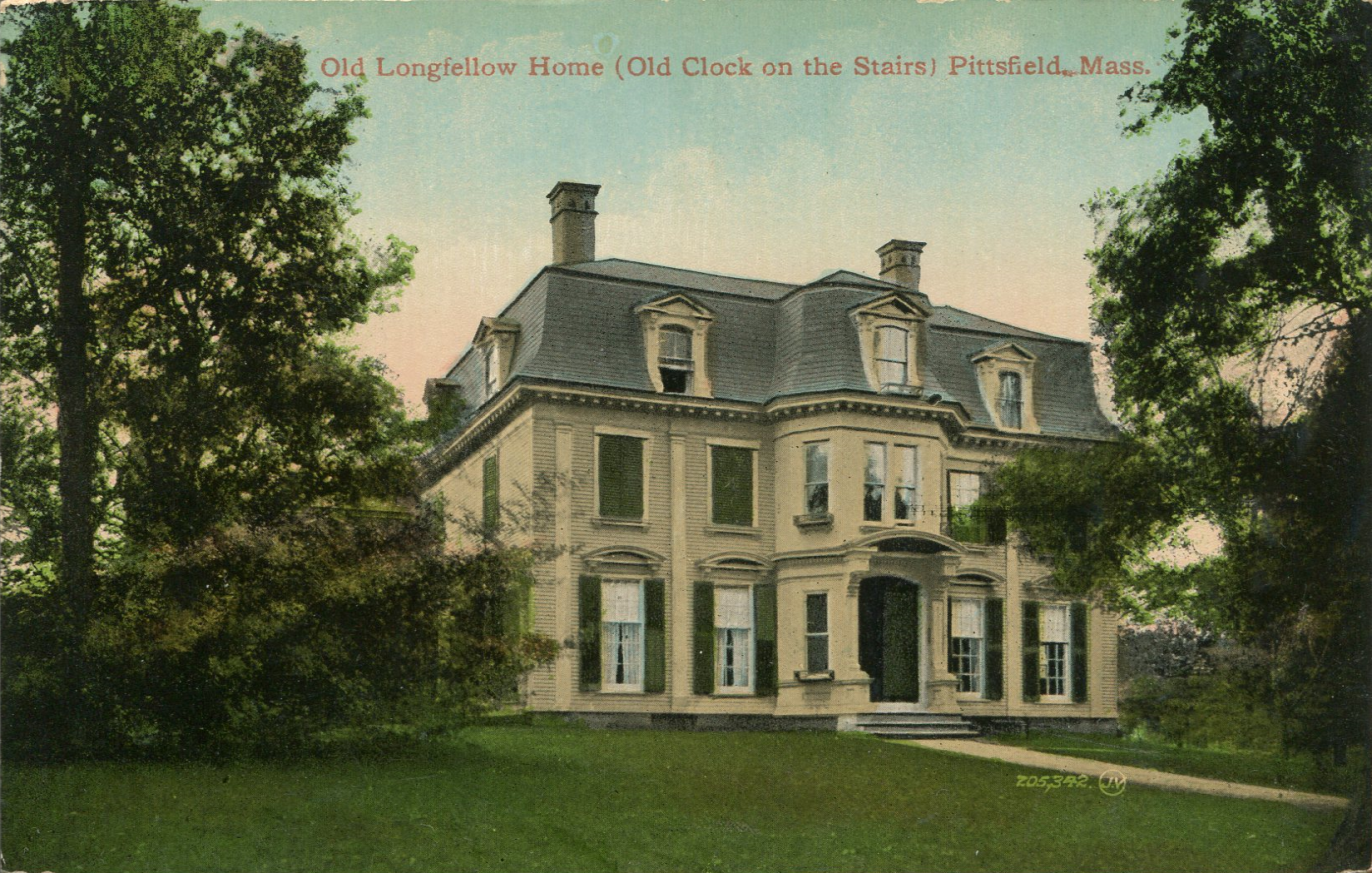
Elm Knoll, circa 1906
Henry Wadsworth Longfellow was born in Portland, Maine in 1807. He was an American poet and educator whose works included Paul Revere’s Ride, The Song of Hiawatha, and Evangeline. His wife, Frances Appleton was the daughter of a Boston merchant who owned this house at the corner of East Street and Appleton Avenue in Pittsfield. The structure was erected in 1790 by Thomas Gold, who was the father-in-law of Nathan Appleton.
When Henry and Frances were married in 1843, they stayed in this house during part of their honeymoon and it was in this house that Henry wrote his famous poem, The Old Clock on the Stairs.
Pittsfield Post Office and Old City Hall
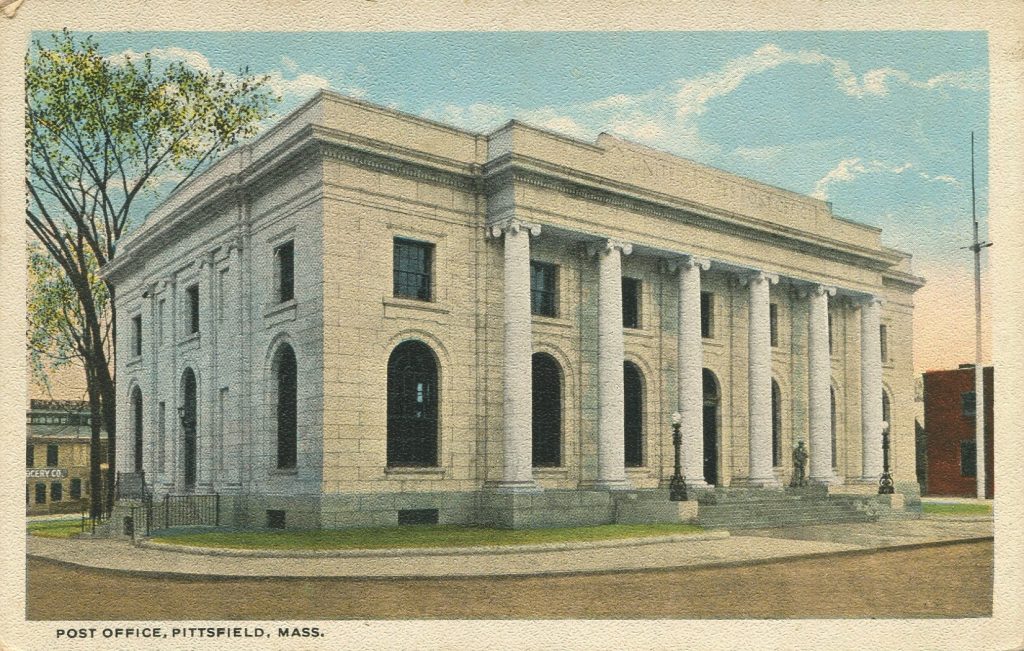
Pittsfield is one of those places where old is new at the same time. For the longest while the post office was in a commercial insurance building across Allen Street from the Episcopal church on Park Avenue. When it was determined that Pittsfield would have its own purpose built post office, this classical revival architectural design was chosen by James Knox Taylor, the supervising architect responsible for designing government buildings across the country. It was a standard for post offices of the era, and it served its worthy purpose until 1966.
When a new post office was built on Fenn Street, the post office became the new city hall.
When the last resident of Elm Knoll left the property in 1929, the house was demolished to make room for the Pittsfield High School.
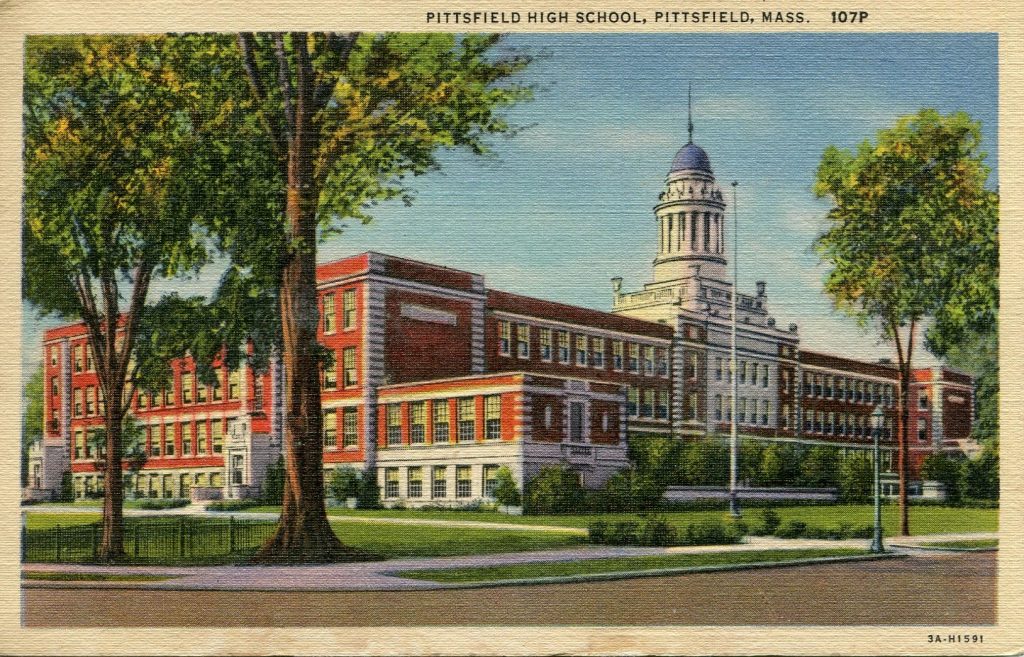
Pittsfield High School Postcard,
Curt Teich, circa 1933
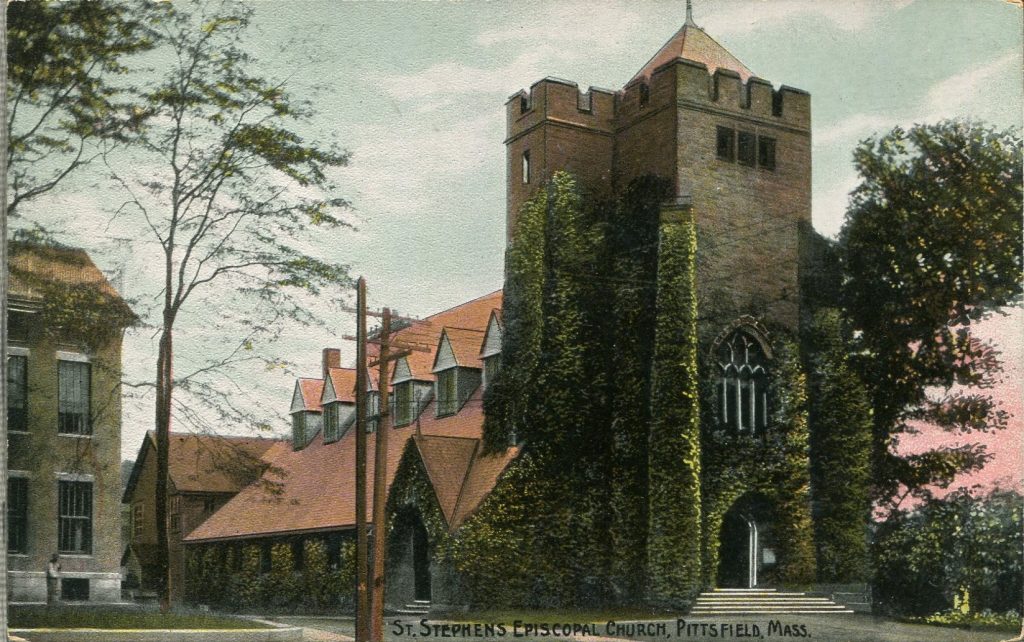
Saint Stephens Episcopal Church,
Pittsfield, Mass.
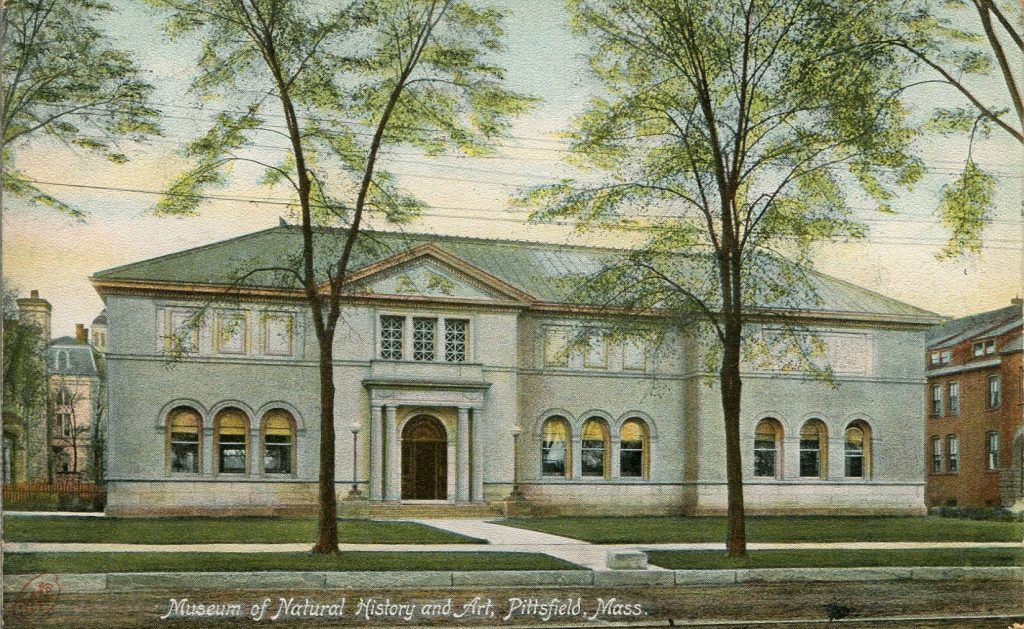
Museum of Natural History and Art,
Pittsfield, Mass.
Lost Pittsfield
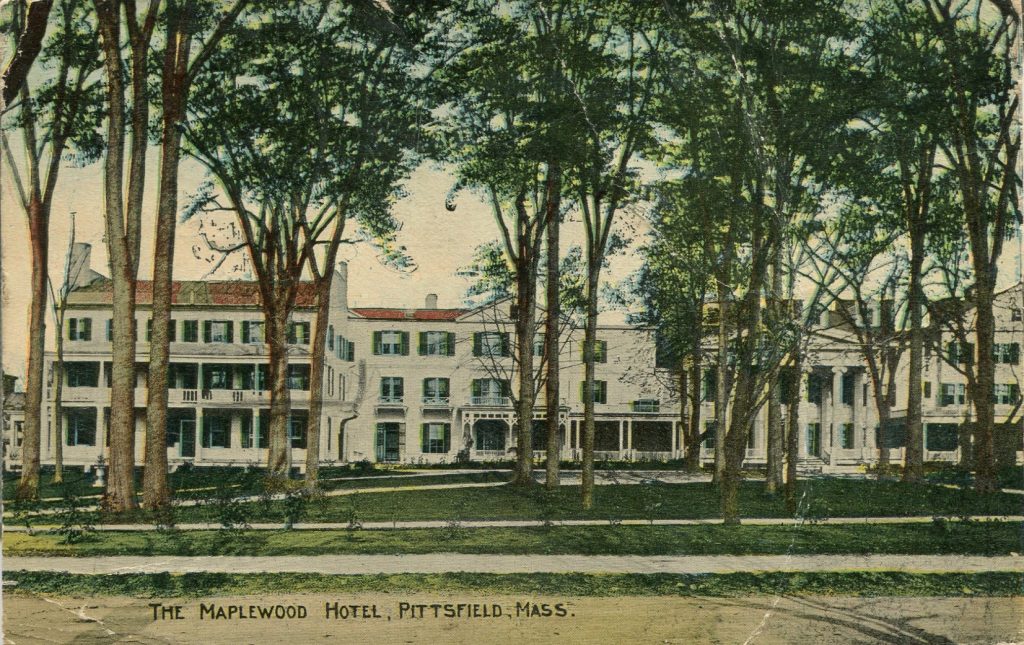
The Maplewood Hotel, Pittsfield, Mass.
This early (1912) Tichnor Brothers (Boston) postcard shows the Maplewood Hotel.
The property under the Maplewood Hotel has served many purposes in the last 200 years.
In the late 1700s it was a military base and a facility for the War of 1812 prisoners. Around 1820 a school was built here and in 1841, the Young Ladies Institute was founded. In 1859 the school hosted the first intercollegiate baseball game.
After the Civil War, the school was unable to survive the economic panic of 1873 and in 1884 it was forced to close. Only three years later the Maplewood Hotel expanded the facility and became one of the first resort hotels in the Berkshires. Like the previous users of the property the hotel was unable to withstand the financial pressures of the Great Depression and was sold in a bankruptcy in 1936.
Nearly all the buildings were demolished by 1938, and later the fountains (unseen on the card) were melted down as scrap metal for the war efforts in the early ‘40s.
The only feature of the hotel that survived were the six columns that framed the front door. They were donated to Tufts University and now support the porch at the front of Ballou Hall in Medford, Massachusetts.
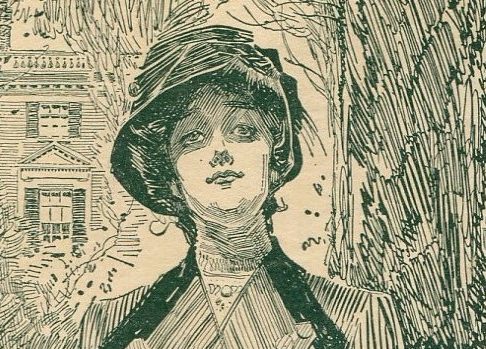
Thanks for the time travel even if it is impossible.
Hooray. I worked in Pittsfield as a camp counselor in 1966 and 1967 but i hadn’t developed the interest in postcards or buildings at that time
The bit about the view from his bedroom window is certainly a whale-of-a-tale. My Dad was a Melville guy and when we lived in Vermont a summer trip to Arrowhead was like a pilgrimage. They always told that story. I would stand and stare at that mountain. I never saw a whale.
I didn’t realize Melville, Holmes, and Longfellow all called Pittsfield home. I first heard of the city when the “new” Washington Senators (now Texas Rangers) had a minor league affiliate there.